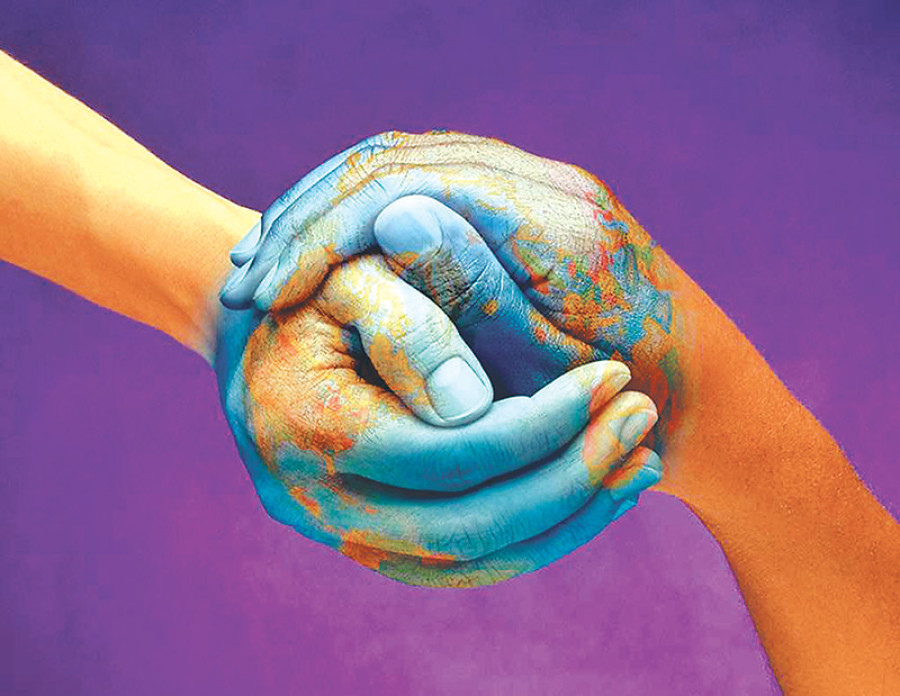Opinion
Of faith and indoctrination
Conversion has once again become a hot topic in Nepali media; however it has always remained an obsessive preoccupation in the minds of evangelists and hill Hindu nationalists in Nepal.
Pramod Mishra
Conversion has once again become a hot topic in Nepali media; however it has always remained an obsessive preoccupation in the minds of evangelists and hill Hindu nationalists in Nepal. For the hill caste nationalist, India is another obsessive preoccupation. In the eyes of such a nationalist, Nepal could disappear at any time, because it could be swallowed by India. They also believe that secularism is a western conspiracy to transform Nepal into a Christian country.
Breeding intolerance
The evangelist Christian missionary is obsessed because any opening in any part of the world offers him a fresh pasture for his God-given mission to proselytise. The nationalist cannot believe that Nepalis can voluntarily become Christians for a number of accountable and unaccountable reasons; the missionary cannot believe that people with the gods and spirits of their forefathers can ever be equal to him and his faith. The nationalist always suspects the role of money and other nefarious temptations in the conversion of his fellow innocent Nepalis and the evangelist always believes that those who do not convert to his ethnocentric, monocultural, singular faith are lost souls, condemned to burn or rot in hell. For the evangelist, his singular faith is the only right one; all the rest is just superstition and false belief—the work of the devil. If Indophobia and Christophobia spoils the nationalists’ sleep and turns his dreams into nightmares, how to convert others into his own faith turns the evangelist’s nightmares into dreams.
In the paragraph above, I may seem facetiously hyperbolical and binary but in many ways both nationalists and evangelists belong to the same fraternity—the fraternity of the intolerant and the narrow minded, and ultimately self-centred. In both cases, anything or anybody that does not conform to their way of faith and community (in one case, their idea of the nation; in the other case, their idea of the path to salvation) are sorely lacking as individuals. In both cases, they don’t live in the reality of the twenty-first century; they only react to it with the potion of centuries past.
Mutual respect
Many years ago, I struck up a friendship with a born-again Christian minister whose group “converted” culturally-raised Christian students into born-again Christians. He was a nice guy. We had frequent open sessions of discussion about the big questions. He would try to prove the scientificity of Jesus Christ; I would argue that Jesus Christ was certainly a prophet and the Bible is a revered holy book without question, and both have taught me a great deal that has significantly shaped my character and life goals, but I also argued that, for other people, there are other equally important prophets and holy, revered books that have equally effectively shaped their lives.
But even after two years of knowing each other, he would still try to make me believe that the only way to God was through Jesus. All other ways were false. This may be true and persuasive for you, I would tell him, but it may not be so for others. When I realised that it was not friendship that was the bond between us but his zeal to make me like him, the balloon of our friendship punctured.
Similarly, I have encountered many Nepali nationalists with degrees from Western universities who are appointed as gatekeepers of scholarship. When these nationalists run in to Madhesis who are smarter than them, they assume that these Madhesis are actually Indian. It is very difficult for them to believe that some Nepalis can acquire their BBC accents just by listening to a short-wave radio, and not by virtue of being a wealthy Indian educated in an expensive English-medium school in India. Many such nationalists find it very difficult to believe that Nepalis can convert to Christianity voluntarily for a variety of reasons other than cash and immediate benefits. These reasons include generations of poverty caused by the state and its caste system, dehumanisation by their fellow faith community, or superstition as a result of miracles and miraculous healing and cures. In a country whose prime minister hardly does anything important without consulting his family astrologer and wears myriads of birth stones for good luck and correlates the alignment of planets and stars with human fate, why should one not believe that common Nepalis can leave one set of dhami-jhakris and visit another set of miracle workers for healing, peace, self-esteem, dignity and solace? And why not do so if it leads to good fortune?
But the catch here is that these new sets of miracle workers preach an ethnocentric doctrine of faith, a singular way to salvation and Godhood. And that is a recipe for future disaster, as we have seen in many parts of the world. Nothing that preaches singularity could be suitable for the twenty-first century. There cannot be only one God and only one prophet if peaceful, tolerant mutually respectful coexistence is to be promoted. Whoever spreads and preaches such doctrine needs to be challenged. Why not preach like the Dalai Lama or Gandhi? You can remain as who you are and we can learn from each other. Why should you give up your religion? You can benefit from other religions without giving up the one you follow, and others can benefit from your religion without becoming exactly like you. To the Nepali hill caste Hindu nationalist, I would say this: start a campaign to put your own house in order first and only then can you go about criticising conversion.
- Mishra is department Chair of English Studies at Lewis University in the United States




 9.89°C Kathmandu
9.89°C Kathmandu










